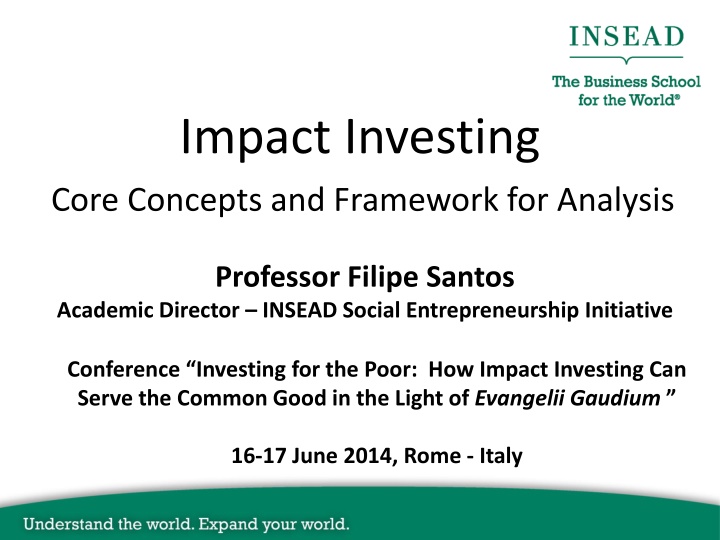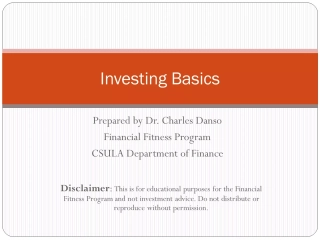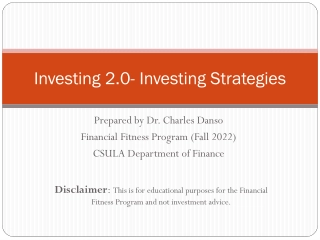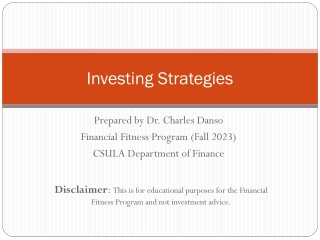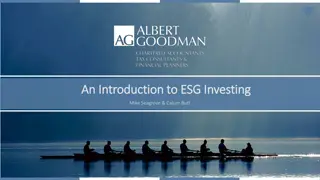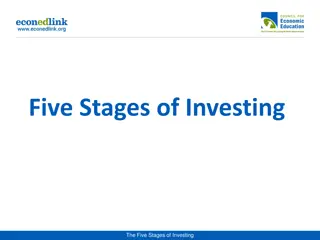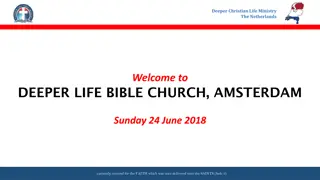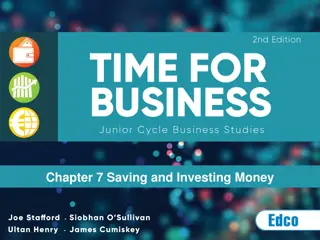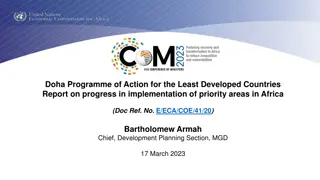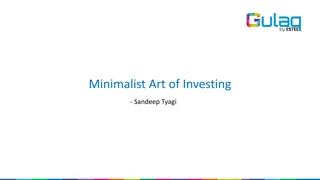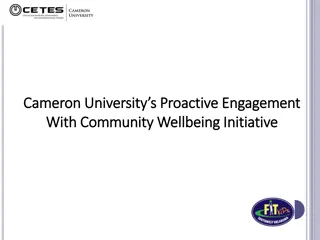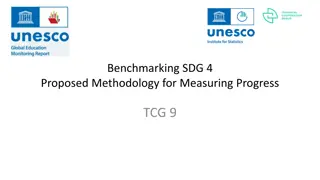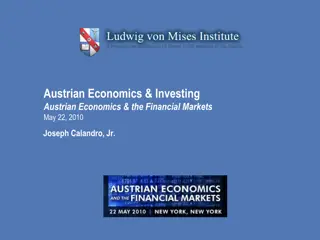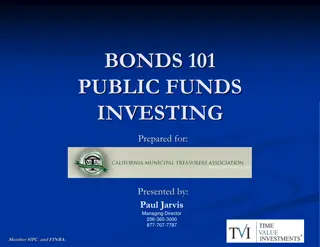Impact Investing and Societal Progress: An Overview
Explore the core concepts of impact investing, sectoral trends, and the motivation behind it. Learn how impact investing can address gaps in resource allocation and bring about positive societal change in alignment with Pope Francis's message on inclusive growth.
Download Presentation

Please find below an Image/Link to download the presentation.
The content on the website is provided AS IS for your information and personal use only. It may not be sold, licensed, or shared on other websites without obtaining consent from the author.If you encounter any issues during the download, it is possible that the publisher has removed the file from their server.
You are allowed to download the files provided on this website for personal or commercial use, subject to the condition that they are used lawfully. All files are the property of their respective owners.
The content on the website is provided AS IS for your information and personal use only. It may not be sold, licensed, or shared on other websites without obtaining consent from the author.
E N D
Presentation Transcript
Impact Investing Core Concepts and Framework for Analysis Professor Filipe Santos Academic Director INSEAD Social Entrepreneurship Initiative Conference Investing for the Poor: How Impact Investing Can Serve the Common Good in the Light of Evangelii Gaudium 16-17 June 2014, Rome - Italy
My Message Societal Context A Vision for the Future Breaking Prejudices Principles of Sustainability Rewarding Good (and bad) Outcomes Impact Investing Menu The Promising Role of the Catholic Church
A Society divided in Sectors Commercial Investable Financial Assets Commercial Enterprise Public Sector Budgets & International Development Philantropic Funds and Foundations Endowment Charity and Social Economy Public Sector
Sectoral Trends in the last 10-15 years Commercial Investable Financial Assets Social Responsible Investing New Philanthropy Commercial Enterprise Public Sector Budgets & International Development Philantropic Funds and Foundations Endowment Charity and Social Economy Social Public Sector Entrepreneurship
Motivation for Impact Investing Increased dissatisfaction with role of the financial system in allocating resources in productive way Dissatisfaction with sustainability and impact of traditional charitable models Increased dissatisfaction with gaps and inefficiency in public services funding Role of Impact Investing: Pursuing higher effectiveness in capital allocation at societal level by leveraging decentralized mechanisms, in particular the ability of social entrepreneurs to develop innovative solutions to neglected societal problems
Pope Franciss Message to WEF 2014 we must praise the steps being taken to improve people s welfare in areas such as health care, education and communications (Evangelii Gaudium, 52), in addition to many other areas of human activity, and we must recognize the fundamental role that modern business activity has had in bringing about these changes, by stimulating and developing the immense resources of human intelligence. Nonetheless, the successes which have been achieved, even if they have reduced poverty for a great number of people, often have led to a widespread social exclusion. I wish to emphasize the importance that the various political and economic sectors have in promoting an inclusive approach which takes into consideration the dignity of every human person and the common good. I am referring to a concern that ought to shape every political and economic decision, but which at times seems to be little more than an afterthought. Those working in these sectors have a precise responsibility towards others, particularly those who are most frail, weak and vulnerable. I know that these words are forceful, even dramatic, but they seek both to affirm and to challenge the ability of this assembly to make a difference. In fact, those who have demonstrated their aptitude for being innovative and for improving the lives of many people by their ingenuity and professional expertise can further contribute by putting their skills at the service of those who are still living in dire poverty. What is needed, then, is a renewed, profound and broadened sense of responsibility on the part of all. Business is - in fact - a vocation, and a noble vocation, provided that those engaged in it see themselves challenged by a greater meaning in life (Evangelii Gaudium, 203). Such men and women are able to serve more effectively the common good and to make the goods of this world more accessible to all.
A Vision for the Convergent Economy Commercial (SRI) Investable Financial Assets Commercial Enterprise Social Entrepreneurship Cross-Sector Public Sector Budgets & International Development Philantropic Funds and Foundations Endowment Charity and Social Economy Social Public Sector Entrepreneurship fueled by IMPACT INVESTING
Impact Investing The purposeful allocation of financial resources to initiatives that can deliver measurable societal impact (social and environmental) alongside financial return. Some Fundamental Principles of Impact Investing: Invest in Sustainable Solutions (that generate revenue and build capacity) Support Scalable Models (solutions for global problems) Pay for Success (incentivize and reward positive outcomes) Pursue alignment of profit and impact (no compromise)
Breaking Prejudices - 1 Chico, an entrepreneur in Brazil, developed an innovative software solution to teach English to affluent school-kids from the cities. The business he founded and leads helped more than 2,000,000 clients learn English and enter University. He received $US 1M in salary last year.
Breaking Prejudices - 1 Jo o, an entrepreneur in Brazil, developed an innovative software solution to teach English to poor kids from the favelas. The charity he founded and leads helped more than 2,000,000 beneficiaries learn English and enter University. He received $US 1M in salary last year.
Breaking Prejudices - 1 Chico, an entrepreneur in Brazil developed an innovative software solution to teach English to affluent school-kids from the cities. The business he founded and leads helped more than 2,000,000 clients learn English and enter University. He received $US 1M in salary last year. Jo o, an entrepreneur in Brazil developed an innovative software solution to teach English to poor kids from the favelas. The charity he founded and leads helped more than 2,000,000 beneficiaries learn English and enter University. He received $US 1M in salary last year.
Why this Prejudice? It is wrong to make money from the poor... - this leads to the implication that one should make less money serving the poor than serving the rich The poor are weaker and should be protected... - But we have learned in decades of Base of the Pyramid business that poor people want and can be treated as consumers with choices and preferences and ability to pay The profit motivation will lead to lower impact... - This is the most difficult issue to address...
The (Mis)Alignment of Profit and Impact? Two tales of microcredit: Bangladesh and India A strategic choice to focus on areas of high alignment Domains with value spillovers: education, health, housing, food, employment Access to infrastructure: energy, water, transport, communication, finance Focus on clients who are excluded or disadvantaged Design business models for perfect alignment Microinsurance for HIV positive patients in South Africa Chico and Jo o (Brazilian entrepreneurs) revisited
Breaking Prejudices - 2 You invested last year 10,000 euros in a business in Italy that serves the elderly by building and managing retirement homes. They found an innovative way to cut costs while maintaining the quality of care and made 10M euros of profit that year. They ask your for more capital to grow.
Breaking Prejudices - 2 You donated 10,000 euros last year to a charity in Italy that serves the elderly by building and managing retirement homes. They found an innovative way to cut costs while maintaning the quality of care and made 10M euros of profits that year. They ask you for more donations to grow.
The First Principle of Sustainability An organization that is not able to provide a fair reward to its key resource providers is in a path of self-destruction. Profit is no more or less than the reward to the equity capital providers and to entrepreneurial talent for a job well done (salary is the reward for labour, interest is the reward for loans, market price is the reward for suppliers, emotional benefits is the reward for volunteers) For a charity that cannot pay dividends, accumulated profits is the best source of long-term capital and will lead to organizational strength and resilience
The Second Principle of Sustainability A business is only truly sustainable when it is designed to create positive impact for its clients and key stakehlders The defining element of an impact business is overriding concern with sustainability of value creation for clients/stakeholders (and/or planet). This sets impact businesses apart from commercial businesses, which have an overriding concern with maximizing value for the owners
Rewarding the Right Outcomes Everything bad that happens in the Economy and Markets is not because we reward people generously, but because we start rewarding the wrong outcomes... Examples: Rewarding revenue growth (two tales of microfinance revisited as well as the financial crisis) Rewarding short-term profits or asset appreciation (speculation) Rewarding stock price increases (perception of value) Rewarding quarterly sales quotas Rewarding potential acquisition values ... And so on Instead, we should reward long-term profits and impact
The Importance of Measuring Impact Realizing the promise of impact investing depends on our ability to make progress in reliably measuring impact and achieving comparability of outcomes This is not the same as monetizing all outcomes (e.g. putting a price on human life or happiness)... Example: - Charity A is capable of saving 1000 lives and their regional intervention costs $2000 per beneficiary with 80% success - Charity B at a local level can save 100 lives at a cost of $1000 per intervention with 90% success - The dominant public solution at large scale costs $5000 per intervention and has 60% success The issue here is not so much creating a market but rather creating incentives and mechanisms for systemic innovation in the provision of public services (impact bonds)
A Menu of Impact Investing choices One size does not fit all there are different types of societal problems requiring different solutions and may benefit from different flavours of impact investing: Societal Problems that can be solved through market mechanisms (product or service that clients can buy): Impact Investing Funds Societal Problems that are typically the purview of public authorities (public goods): Social Impact Bonds Societal problems that involve marginal segments of the population who are severily excluded (charitable services): Venture Philanthropy Different flavours but with the common goal of fueling social entrepreneurship to deliver social innovations and building the capacity in our society and systems to mainstream them
A Vision for Impact Investing Commercial (SRI) Investable Financial Assets Impact Investing Impact Investing Funds Public Sector Budgets & International Development Philantropic Funds and Foundations Endowment Social Entrepreneurship Venture Philanthropy Social Impact Bonds
